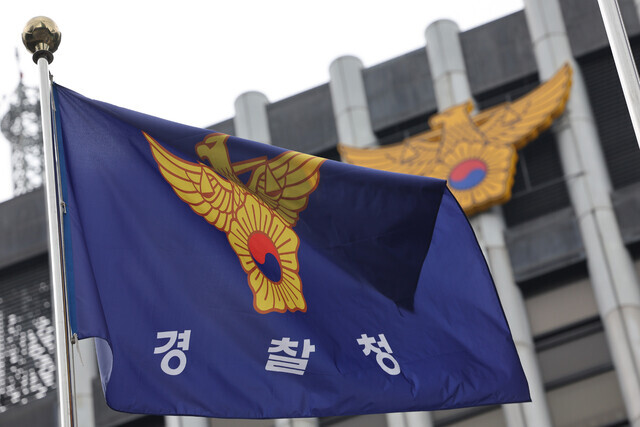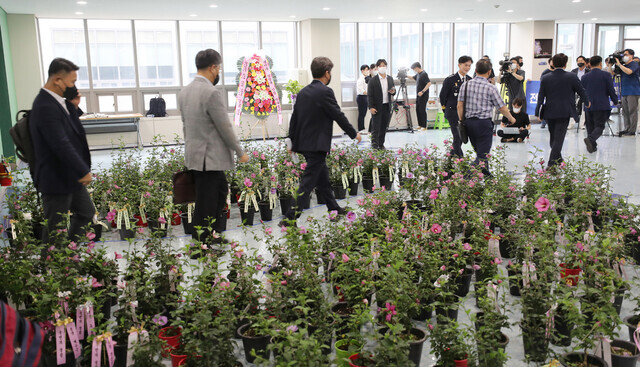hankyoreh
Links to other country sites 다른 나라 사이트 링크
Gathering of Korea’s police chiefs touches off storm of disciplinary action by higher-ups

The fallout from a meeting of police chiefs from around Korea has arisen as an unexpected challenge for President Yoon Suk-yeol, who is already battling a plummeting approval rating.
The presidential office moved quickly to crush police opposition to oversight by the Ministry of Interior and Safety by urging that disciplinary measures be taken against police chiefs who had attended the meeting. But that has only inflamed dissent, with some members of the police openly daring the government to punish them. Mid-ranking police inspectors and senior inspectors have also announced a nationwide meeting will be held Saturday to protest the use of disciplinary measures to quash dissent.
The ruling party’s criticism of the police and the National Police Agency’s adoption of disciplinary measures against police chiefs, who wield great influence over their precincts, appear to have been prompted by the unexpectedly high turnout at the meeting.
The National Police Agency (NPA) leadership intended to shut down the debate over the Interior Ministry’s proposed police oversight bureau during a meeting with the Police Occupational Council, which is largely composed of low-ranking police officers, on Thursday. The NPA assumed that once the so-called “police bureau” launches under the Interior Ministry on Aug. 2, the controversy would die down on its own.
But when the police chiefs who have immediate control over Korea’s 140,000-strong police force stirred the pot, the NPA resorted to the harsher measure of launching inspections and taking disciplinary action.
In fact, the number of police chiefs who attended the meeting on Saturday, July 23, at the Police Human Resources Training Institute in Asan, South Chungcheong Province, was greater than expected.
At the meeting, 357 police chiefs at the rank of senior superintendent — more than half of the 650 or so people of that rank in the force — put their names on the line to oppose the creation of a police bureau within the Interior Ministry, which is one of the Yoon administration’s chief reform initiatives for the country’s law enforcement.
The coveted rank of senior superintendent is the launching pad for high rank in the police force, where personnel assignments and promotions are a matter of keen interest. As such, there were few even inside the force who expected that senior superintendents would engage in collective action on that scale.
The police chiefs’ revolt was triggered by remarks on July 18 by Yoon Hee-keun, the president’s nominee for NPA commissioner general, who said the police should stop worrying about the creation of the police bureau and start focusing on better working conditions, including higher pay.
Shortly after the nominee for commissioner general made that “insulting proposal” (in the words of senior superintendent Ryu Sam-yeong) to trade the police’s political independence for job perks, a group chatroom was hastily set up for senior superintendents, bringing together more than 500 of them within a matter of days.
“I was wondering what to do about our feckless leaders, who said they’d run out of options, when someone suggested setting up a meeting of police chiefs. Lots of like-minded senior superintendents attended the meeting both in person and virtually,” a senior superintendent who was in attendance told the Hankyoreh on Sunday.
“Seeing how opposed my staff are to the police bureau, I couldn’t help thinking that we ought to be doing something as their commanders,” said another senior superintendent who was there.
“As commanders on the ground, senior superintendents can’t maintain discipline in the force if they just parrot what they hear from their superiors,” one superintendent general said.
Prior to the meeting of police chiefs, Interior and Safety Minister Lee Sang-min had warned that the meeting was “highly inappropriate,” but he stayed mum on Sunday amid a flurry of inspections and disciplinary action.
At the same time, the ruling People Power Party and even the president’s chief of staff, Kim Dae-ki, were openly critical of the police chiefs.

Considering that Yoon Suk-yeol slammed the NPA for a breach of discipline after reassignments for the rank of senior superintendent general were published without the president’s approval, the harsh response may reflect the president’s own distrust of the police.
Another reason for pushback from the police is the double standard toward collective action by prosecutors and police that has been exhibited by the Yoon administration, which is under the thumb of former prosecutors, including Yoon himself.
Previously, the ruling camp goaded successive group action from prosecutors opposing the revision of the Prosecutors’ Office Act through the presidential transition committee. At the time, prosecutors across ranks condemned the president, the National Assembly, and the justice minister in a sweeping criticism, while junior prosecutors held a national meeting over two weekdays and prosecutors of the criminal affairs bureau under the direct command of the justice minister also held a meeting to express their opposition to the revision.
Regarding this, an official in the presidential office slammed the meeting among police station chiefs who have more responsibility than junior prosecutors, commenting, “Junior prosecutors held a meeting by gathering opinion from other junior prosecutors in their prosecutors’ office. Their meeting was fundamentally different from that among those in charge of public order who deserted their post and gathered for a meeting.”
In response, Ryu said, “[Participants] attended [the meeting] abided by the legal process, such as reporting that they were traveling outside their jurisdiction on their off day. No wrong was done.”
A police superintendent stationed in the Seoul metropolitan area who did not attend the meeting also expressed their discontent, stating, “Prosecutors have never faced penalties despite multiple meetings.”
Members of the police uploaded post after post on the agency’s internal network, demanding they be placed on stand-by as well and urging police chief nominee Yoon Hee-keun to step down.
A police superintendent stationed at the Korean National Police Academy reported themselves as having attended the police station chiefs’ meeting, stating, “I hereby report that I attended the meeting to secure the neutrality and independence of the police. There’s no need to track down a list of names.”
A police officer stationed at South Gyeongsang Provincial Police Agency said, “We do not want a police chief who only looks at the president and the minister while turning a blind eye to the public and members of his organization.”
A police superintendent who did not attend the meeting commented, “It’s inevitable that Yoon lacks the strength to withstand pressure from the higher-up as someone who rose through the ranks quickly. With politicians joining in on the debate, the internal fissure within the police only seems to have deepened.”
By Park Su-ji, staff reporter; Jang Na-rye, staff reporter; Ko Byung-chan, staff reporter
Please direct questions or comments to [english@hani.co.kr]

Editorial・opinion
![[Column] Has Korea, too, crossed the Rubicon on China? [Column] Has Korea, too, crossed the Rubicon on China?](https://flexible.img.hani.co.kr/flexible/normal/500/300/imgdb/original/2024/0419/9317135153409185.jpg) [Column] Has Korea, too, crossed the Rubicon on China?
[Column] Has Korea, too, crossed the Rubicon on China?![[Correspondent’s column] In Japan’s alliance with US, echoes of its past alliances with UK [Correspondent’s column] In Japan’s alliance with US, echoes of its past alliances with UK](https://flexible.img.hani.co.kr/flexible/normal/500/300/imgdb/original/2024/0419/2317135166563519.jpg) [Correspondent’s column] In Japan’s alliance with US, echoes of its past alliances with UK
[Correspondent’s column] In Japan’s alliance with US, echoes of its past alliances with UK- [Editorial] Does Yoon think the Korean public is wrong?
- [Editorial] As it bolsters its alliance with US, Japan must be accountable for past
- [Guest essay] Amending the Constitution is Yoon’s key to leaving office in public’s good graces
- [Editorial] 10 years on, lessons of Sewol tragedy must never be forgotten
- [Column] A death blow to Korea’s prosecutor politics
- [Correspondent’s column] The US and the end of Japanese pacifism
- [Guest essay] How Korea turned its trainee doctors into monsters
- [Guest essay] As someone who helped forge Seoul-Moscow ties, their status today troubles me
Most viewed articles
- 1[Column] The clock is ticking for Korea’s first lady
- 2After 2 months of delayed, denied medical care, Koreans worry worst may be yet to come
- 3Hong Se-hwa, voice for tolerance whose memoir of exile touched a chord, dies at 76
- 4Samsung barricades office as unionized workers strike for better conditions
- 5[Column] Has Korea, too, crossed the Rubicon on China?
- 6US overtakes China as Korea’s top export market, prompting trade sanction jitters
- 7[Editorial] As it bolsters its alliance with US, Japan must be accountable for past
- 8[Correspondent’s column] In Japan’s alliance with US, echoes of its past alliances with UK
- 9All eyes on Xiaomi after it pulls off EV that Apple couldn’t
- 10[Guest essay] How Korea turned its trainee doctors into monsters